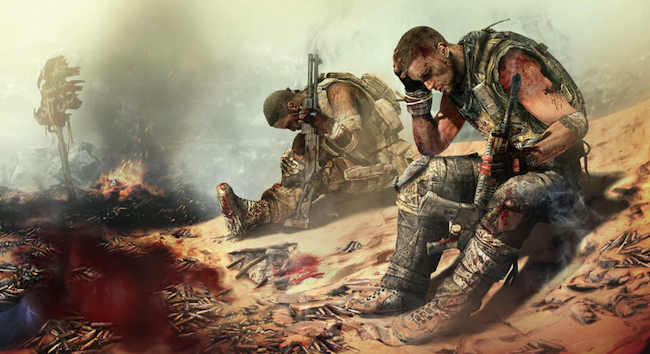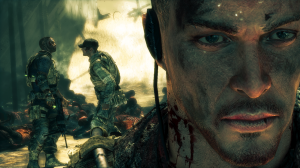
It’s been six months since Dubai fell victim to the most devastating dust storm The United Arab Emirates had ever experienced. Politicians and the wealthy alike secretly abandoned the city, whilst countless Emiratis remained left for dead. Lieutenant Colonel John Konrad, leader of the 33rd Battalion of the United States Army volunteered his company to assist in the relief efforts after being caught in the storm on their way home from Afghanistan.
The situation quickly became dire, and it wasn’t long before Konrad was ordered to abandon his efforts and return home. The Colonel, fighting his own war against post-traumatic stress, could not accept his orders and with his entire company deserted and declared martial law to maintain order within the city. The last communication recorded from the Colonel stated that the 33rd had set out with a caravan of over one thousand survivors in an attempt to flee the disaster.
However, the caravan never arrived at it’s destination, and no further communication was received from the city. Shortly after these events, the UAE declared Dubai a ‘no man’s land’, banning all travel to the city and the 33rd were publically disavowed by The United States for treason. At least that was the case until two weeks prior to the beginning of the game, when a looped radio signal from the Colonel managed to penetrate the storm wall. It only stated that the evacuation was a complete failure and the death toll was too many.
You are Captian Martin Walker, leader of the three-man Delta Force Team. Your mission is straightforward, confirm the status of Konrad, locate any remaining survivors and radio for Evac. However, things are never that simple. Prepare yourself to witness the atrocities of the 33rd and the devastation that lays in the wake of what they call order. You are the hero, and these people need you to save them.
Narrative is the core focus in Spec Ops: The Line, so be prepared to confront some seriously heavy themes in your experience. There are a few intriguing moments within the game that allow you to decide on morally complicated issues, but for the most part, the game is a third person, cover based shooter and it plays out like one.
It would be easy for someone who didn’t know too much about the game to immediately dismiss it as a Gears of War or Call of Duty clone. This would be unfortunate as Spec Ops: The Line quickly establishes itself as much more than an imitation. It is not an experience that romanticizes the acts of war, and in some way almost encourages the player to feel remorse for the enjoyment they’ve taken from these other games.
Yes, the action is highly stylised, and it’s fun to play. However, with so many horrible atrocities occurring all around you, it’s not a headshot count that you will be concerned with. To be a hero is usually quite straightforward. Kill all the bad guys, and then save the world. Simple, right? Wrong. In the real world people with good intentions do not always make the right decisions, and this is even more apparent in war.
Prepare to realize the mistake that sometimes when you think you’re doing the right thing, you may inadvertently be doing the exact opposite. This is what separates Spec Ops from other games in its likeness. It doesn’t matter how much you want to be a hero, this is not a game that will shower you with glory and will often cause you to reflect on what is happening around you.
At it’s core Spec Ops: The Line is still a third person shooter and you will find yourself taking cover and shooting your way from one point to another. The set piece moments can be visually inspiring, but it’s not going to be anything you haven’t seen before. There are some basic squad commands available to the player which can be used to target particular enemies and heal team mates, and whilst it works reasonably well, it’s not a necessity to the game by any means.
The Unreal Engine has been optimized to it’s full potential, so you can expect moments where you will just want to stop and stare out into the wreckage that was once Dubai. The visual design can appear a little inconsistent at times, but for the most part this is a fantastic looking game. The dust and particle effects are all well realized, and it makes for a unique experience as you traverse the city.
As you may have expected, Nolan Norths portrayal of Captain Walker thoroughly shines throughout the experience. He is a talented voice actor, and with commendable performances from all of the other voice actors too, the characters are bought to life and feel very genuine. The music featured throughout the game is relevant and well composed, but you will not find anything particularly memorable.
By most standards, Spec Ops: The Line would be considered quite a short game as the single player experience will only take around six hours to complete. However, as mentioned earlier, this is a game that focuses all it’s energy into the narrative. If you are able to take this into account, the length of the game will feel appropriate for the story that is being told.
Captain Walker is just a man who wants to be a hero, but it never works out that way. Sure, he has the right intentions, but sometimes we can do more damage than good when trying to help someone. When is it the right time to just walking away, or more appropriately, when should the line be drawn? This is a story that will drag you into the depths of Walker’s psyche and question every action you take, and more specifically, the actions you believe you are forced to take.
On the surface, Spec Ops: The Line may appear to be just another shooter. It looks and plays the part perfectly, but nothing could be further from the truth. This is an experience that portrays the reality of war in a shockingly realized way, and questions what truly makes a hero. When the story finally comes to it’s conclusion, you will need to take time to reflect on what has happened. It might not be a perfect game, but in my eyes I would dare to say it takes the games industry’s first step into the realm of films such as Apocalypse Now & Memento.
















